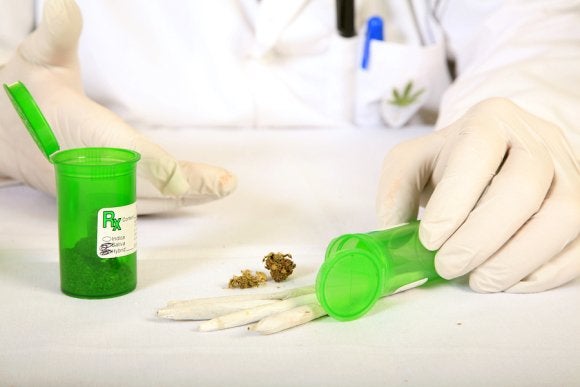-
Initiative 71 and DC’s Marijuana Laws
Last week, D.C. Mayor Muriel Bowser released several documents to help educate the public about DC’s Initiative 71 that legalizes posession of minimal amounts of marijuana for personal use.
- Frequently Asked Questions
- Initiative 71 Factsheet
- Initiative 71 Infographic
-
What Conditions Qualify for Medical Marijuana in Maryland?
On April 14, 2014, Governor Martin O’Malley signed two bills to finally provide qualifying patients with safe access to medical marijuana in Maryland . Last November, the medical marijuana commission set license fees for growers and dispensaries while developing rules for Maryland patients to receive medical marijuana. Once the regulations are approved, Maryland patients suffering from certain diseases will have access to legalized medical marijuana as part of their treatment.
Severe, debilitating or chronic pain
Chronic pain is among the list of conditions qualifying for treatment through medical marijuana in Maryland. Defined as pain lasting longer than six months, chronic pain is a condition in which signals of pain remain active in the nervous system. Common sources of chronic pain include headaches, joint pain, pain from injury and backaches. However, pain targeting certain body parts such as the shoulders and pelvis can also result in chronic pain. For many patients, chronic pain takes an emotional toll, as it can result in anxiety, stress, depression and anger.
Crohn’s disease
A type of Inflammatory Bowel Disease, Crohn’s disease is a chronic inflammatory condition of the gastrointestinal tract. Even though symptoms of Crohn’s disease vary by patient, symptoms often include persistent diarrhea, rectal bleeding, abdominal cramps, and fever. Many people who suffer from Crohn’s disease experience diminished appetite and weight loss. In turn, this can result in low energy and fatigue.Cancer
Research shows medicinal marijuana can help relieve pain, control nausea and vomiting and stimulate appetite in cancer patients. In addition, THC, the active ingredient in marijuana, can decrease pressure within the eyes, which can help reduce the severity of glaucoma. Some supporters of cannabis for cancer treatment claim that marijuana contains anti-bacterial properties, which can slow tumor growth and enlarge the airways.Multiple sclerosis
Multiple sclerosis is a debilitating disease of the central nervous system that disrupts the flow of information between the brain and the rest of the body. Medical marijuana in Maryland can help relieve symptoms associated with multiple sclerosis, including muscle stiffness, muscle spans, and overactive bladder. -
Timeline For Implementation Of New Regulations
On February 11, 2015, Hannah L Byron, Executive Director of the Maryland Medical Marijuana Commission presented a slideshow outlining the timeline for implementation of new regulations to the Maryland Senate. The slideshow includes the milestones and timelines for moving forward.
Click here to view the slideshow.
-
Examining the Issues Surrounding Cannabusiness Regulations in Maryland
In 2014, Maryland lawmakers voted to approve prescription of medical marijuana to certain patients. Currently, a Maryland commission is developing the logistics for licensing Maryland marijuana growers and dispensaries. In addition, the Maryland cannabusiness commission has drafted details of what growing and distributing medical marijuana will look like throughout the state.
The Maryland commission’s draft regulations address issues of prescribing medical marijuana to qualified patients, qualifications for people to grow marijuana, and prescription marijuana labeling requirements for dispensaries. Even though legalization of marijuana in Maryland has considerable support, people want to ensure that the state can successfully restrict access to minors. In the early days of Colorado’s medical marijuana legalization, security was a major issue for licensed marijuana facilities. Learning from other states’ experience in implementing medical marijuana laws, Maryland’s draft rules will require facilities to have security plans and to comply with training procedures and inspection schedules. Even though the commission detailing cannabusiness in Maryland is currently working on logistics, it is unclear when doctors, growers and dispensaries will begin receiving licenses.

-
Founding a Cannabusiness: What You Need to Know
Following the legalization of cannabis in Maryland , entrepreneurs across the state have shown interest in participating in the medical cannabis industry. Even though the Maryland Medical Marijuana Commission is still shaping the medical marijuana dispensary system for the state, Maryland cannabusinesses still need to adopt the existing regulations and prepare for future changes. Michael S. Rothman is a medical marijuana lawyer in Rockville who helps Maryland entrepreneurs structure their cannabusinesses according to Maryland law.
Choosing a business model
There are two business model options for those looking to enter the medical marijuana business in Maryland—opening a dispensary or cultivating marijuana. Currently, Maryland officials are ready to approve 15 legal growers within the first year. More growers may be approved moving forward. In order to become a certified grower, one must undergo thorough background checks. In addition, the state will closely oversee all approved growers. Maryland will allow distribution of medical marijuana to approved patients through highly regulated dispensaries. The Maryland Medical Marijuana Commission will likely grant dispensary licenses beginning in 2015.
Forming a cannabusiness
In order for someone to begin a cannabusiness in Maryland , he or she must first consider the location, supply, and business model. This will ensure that a cannabusiness owner receives the proper licenses. A partnership agreement can help the business succeed because they are mutually beneficial to growers and dispensary owners. There will likely be significant changes when Maryland’s medical marijuana program is actually running. The best way for a new cannabusiness owner to adapt to these changes is by consulting with a Maryland medical marijuana lawyer.Hiring a medical marijuana lawyer
Whether someone is interested in opening a medical marijuana dispensary or cultivating marijuana for medicinal purposes, it’s important for him or her to first consult with a medical marijuana attorney. A medical marijuana lawyer can help a new business owner comply with state and federal law. He or she can also represent a cannabusiness owner in court if the need arises. A medical marijuana lawyer can also provide clients with business formation goals, giving advice on how to succeed in this emerging business field. -
What Might the Future Hold for Marijuana Laws in Maryland?
Although recreational marijuana use isn’t yet legal in Maryland, entrepreneurs are already planning to launch cannabusinesses throughout the state. Prospective cannabusiness owners have been busy looking for investors to fund the significant start-up costs it takes to establish this type of company and they’re searching for employees who are knowledgeable about cannabis.
As you’ll learn by watching this news clip, legalization advocates are hopeful that the legalization of cannabis in Maryland is on the horizon. In fact, Delegate Curt Anderson recently sponsored marijuana laws that would legalize the drug for recreational use. Del. Anderson opined that alcohol and cigarettes are far more dangerous than recreational marijuana, so it only makes sense to legalize the drug.
-
What New Maryland Cannabusiness Owners Can Learn from Seattle’s Marijuana Businesses
Since the legalization of recreational marijuana in Colorado and Washington was approved, the cannabusiness industry has been booming and is expected to continue its rapid expansion. However, unlike Colorado, cannabusiness owners and regulators in Washington have been moving more slowly and cautiously. They want to make sure that they cover all the bases before opening the floodgates to this industry and cannabusiness owners in Maryland can take a page out of their book.
Be a Good Neighbor
Maryland cannabusiness owners will have to deal with the stigma that comes from peddling a previously illegal drug. In all likelihood, not all businesses will welcome having marijuana dispensaries on their block. It’s essential that cannabusiness entrepreneurs learn how to be good neighbors, in part by cultivating the right image for their company. Entrepreneurs can present themselves as professionals, rather than mimicking a frat house mentality.
Send the Right Message with Interior Design
Cannabusiness entrepreneurs in Washington are learning that it pays to consult an interior designer when setting up shop. Creating a positive ambience within the dispensary is critical for helping customers feel welcome. This is particularly true for customers who are a bit nervous about trying marijuana for the first time. In practical terms, this may mean avoiding the temptation to hang Bob Marley posters on the walls and instead arranging the interior much like any other retail shop.Partner with a Financial Institution
Marijuana businesses in Colorado and Washington have already run across several major stumbling blocks, one of which involves banking. Until recently, federal regulations stated that financial institutions and their employees could face lengthy prison sentences for dealing with cannabusinesses because marijuana is still illegal under federal law. Although federal regulations have now changed to allow financial institutions to deal with cannabusinesses that are legal under state law, it’s still a touchy subject for banks and credit unions. They may be hesitant to work with marijuana entrepreneurs. This means it’s essential for cannabusiness owners to form a strong partnership with a financial institution. -
What Decisions Do Cannibusinesses Need to Make to Set Up?
To take advantage of rapidly evolving Maryland marijuana laws and the expanding climate of acceptance regarding cannabis , prospective cannabusiness owners need to spend plenty of time planning how to get a foothold in this burgeoning industry. A medical marijuana lawyer can help new owners of marijuana dispensaries and other cannabusinesses make critical decisions regarding the formation of their new entities. First, entrepreneurs must decide exactly which type of business they wish to launch. The state will begin approving new growers and dispensaries.
Once entrepreneurs have chosen the type of cannabusiness they wish to pursue, they must plan the structure of their business. Like any other type of business, cannabusiness entrepreneurs must decide where to locate the place of business, how to obtain the proper licenses, how to remain in compliance with changing laws, how to supply the business, and how to address security concerns. Entrepreneurs will need to determine their business models and decide exactly how to run their companies, such as with a partnership or other entity.

-
How Can Patients Get Medical Marijuana Cards in Maryland?
Advocates of medical marijuana say that the drug can help with everything from chronic pain to glaucoma. It may be used to treat seizure disorders, Crohn’s disease, and nausea from chemotherapy. However, while MD marijuana laws now allow the use of medical marijuana, it is still highly regulated. Prospective cannabusiness customers will need to meet strict eligibility requirements and follow a specific procedure in order to obtain a medical marijuana card.
Understand Limitations and Protections
Before prospective patients visit a Maryland cannabusiness, they should fully understand the ramifications of the new medical marijuana laws and how this legislation might affect them. Marijuana laws officially recognized the legal use of medical marijuana in April of 2013 with the
passage of House Bill 881. The bill allows certain patients to legally possess a 30-day supply of the drug. The amount that constitutes a 30-day supply has yet to be determined. The bill allows card-carrying patients and caregivers to be exempt from prosecution for purchasing and possessing medical marijuana , but only if the drug was acquired from a state-licensed dispensary. Patients and caregivers are not allowed to cultivate marijuana for medicinal purposes. Additionally, the new marijuana laws do not prohibit civil discrimination of patients and caregivers with regard to employment, housing, child custody, and organ transplants.
Fulfill the Eligibility Criteria
To obtain a medical marijuana card, patients must meet strict guidelines. They must be residents of Maryland and they must be able to provide proof of residency. In addition, they must be able to prove with the use of medical records that they have a qualifying medical condition. Qualifying conditions include chronic or debilitating conditions that result in persistent muscle spasms, severe nausea, severe or chronic pain, seizures, anorexia, wasting syndrome, or cachexia.Obtain a Written Certification
A written certification from a licensed Maryland physician will enable patients to obtain medical marijuana. However, only physicians who have received a special medical marijuana license may prescribe this drug to patients. Additionally, the law emphasizes that patients are encouraged to develop a long-term relationship with the prescribing physician.

